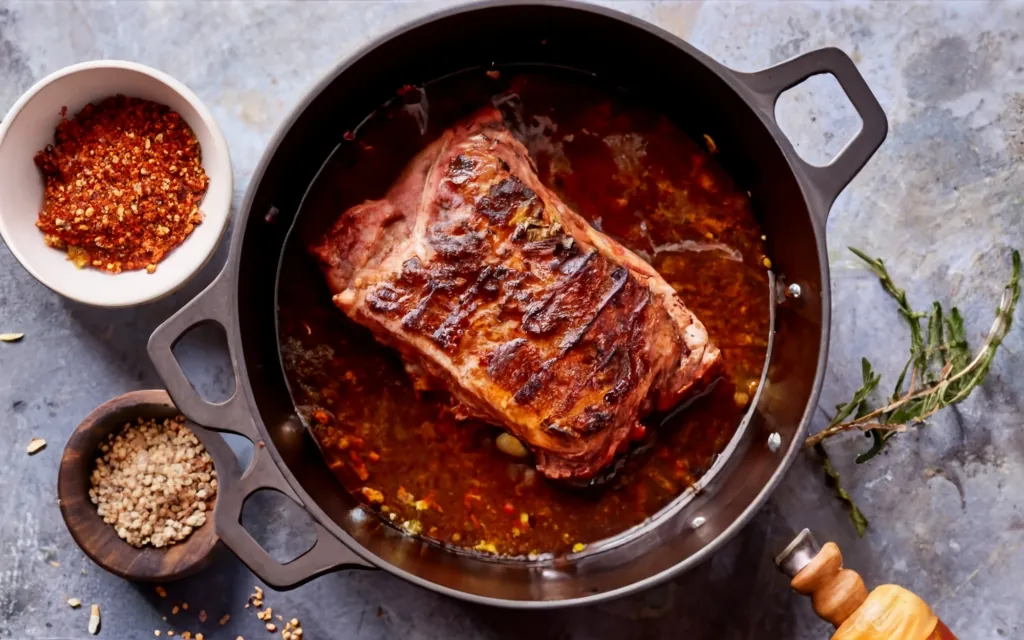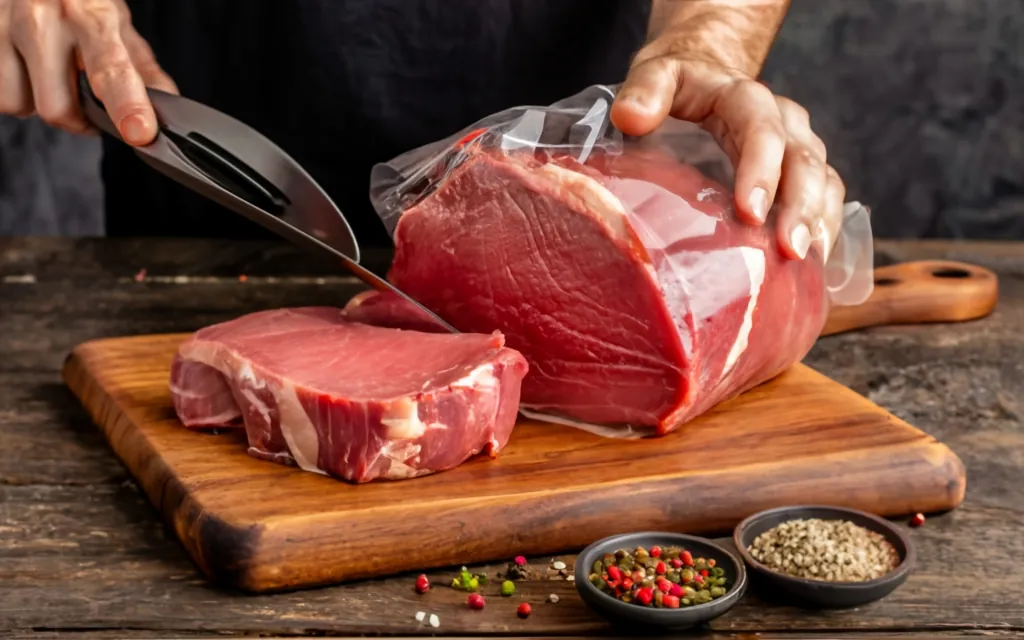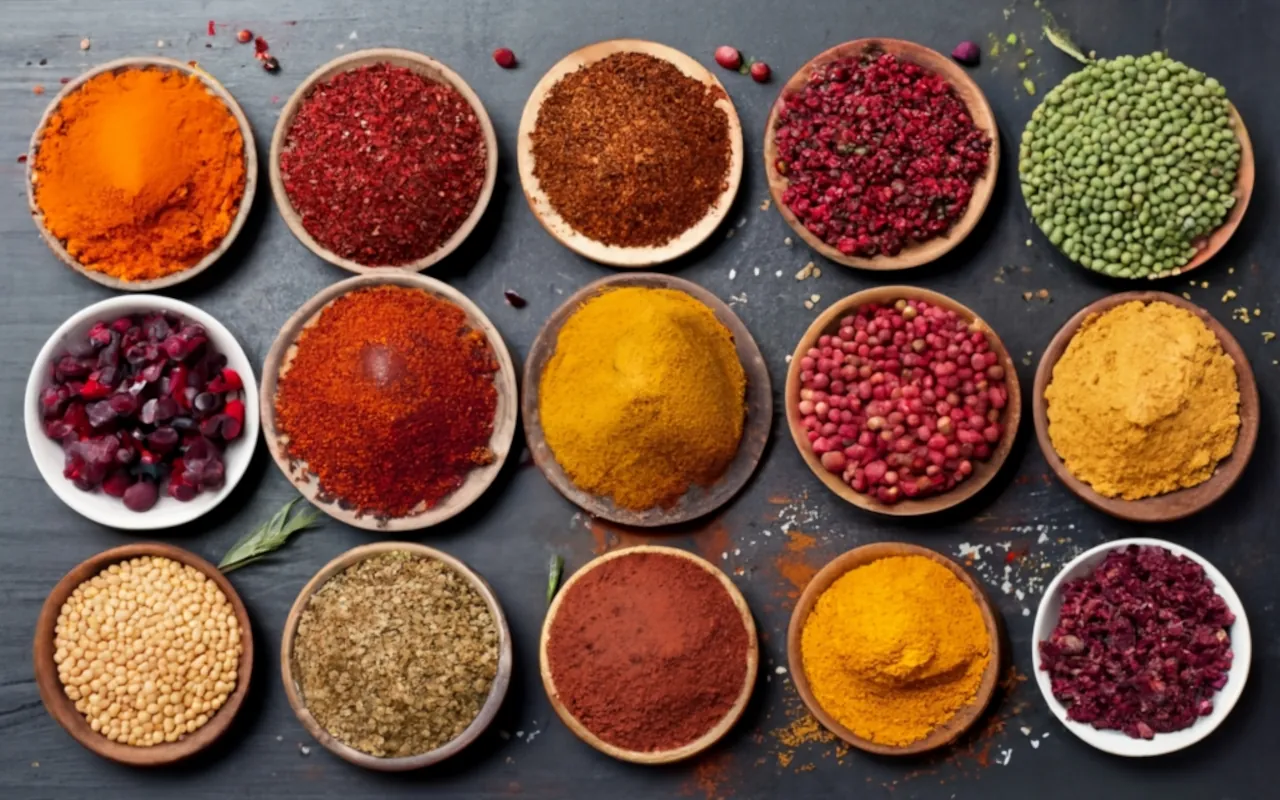Introduction to Marinating: Discovering the Best Spices for Meat
In this guide, we will explore a variety of spices for marinating meat, essential for any culinary enthusiast. Marinating meat is a culinary art that significantly enhances the flavor and texture of your dishes. Central to this transformative process are three main ingredients: acid, oil, and, most importantly, the right spices. This comprehensive guide delves into the best spices for marinating meat, revealing how they work in harmony with other ingredients to elevate your culinary creations.
The art of marinating isn’t just about soaking meat; it’s about creating a delicate balance of chemistry and flavor. Acids like vinegar or citrus juice tenderize the meat, breaking down proteins. Oils carry and infuse flavors from herbs and spices into the meat, retaining moisture during cooking. The spices, from aromatic herbs to bold flavors, are crucial in imparting unique and tantalizing tastes.
Understanding the interplay of these components, especially the spices, is essential for any aspiring chef or home cook. Whether you’re grilling a steak, roasting chicken, or preparing a seafood feast, choosing the right spices for your marinade can transform your dish from ordinary to extraordinary. Join us on this flavorful journey to unlock the secrets of the best spices for marinating meat, enhancing every meal with depth and complexity.
The Science of Marination: Choosing Spices for Meat

Understanding how acids, oils, and spices for marinating meat interact is crucial for the marination process.
How Acids Enhance Flavor: A Key Component in Spice-Infused Marinades
Acids are a cornerstone of any effective marinade. Commonly sourced from ingredients like lemon juice, vinegar, or yogurt, acids play a vital role in the marinating process. They work by breaking down proteins in the meat, a process that tenderizes and allows deeper penetration of flavors. However, the choice of acid and the duration of marination are crucial. Over-marinating, especially with strong acids, can lead to a mushy texture as the proteins break down excessively.
Oils in Marinades: Essential for Infusing Spices into Meat
Oil in marinades isn’t just about moisture; it’s a medium that helps dissolve and distribute fat-soluble flavor compounds found in many spices and herbs. Oils such as olive, canola, or sesame, depending on the cuisine, coat the meat, ensuring an even distribution of flavors. Additionally, oil forms a protective layer on the meat, helping to lock in moisture during the cooking process. This is particularly important for methods like grilling or roasting, where high heat can dry out meat.
Seasoning Mastery: Choosing the Right Spices for Meat Marination
Seasonings are what give each marinade its unique character. This category includes a wide array of herbs, spices, and aromatics. From the warmth of paprika to the brightness of fresh herbs like rosemary or thyme, seasonings are the soul of your marinade. They can be tailored to complement the specific type of meat and the desired final flavor profile. Understanding how different seasonings interact and complement each other is key to creating a successful marinade.
The Art of the Perfect Marinade: Balancing Spices and Ingredients
Balancing the Ingredients
Creating the ideal marinade is an art that requires a harmonious balance of acid, oil, and seasonings. The trick lies in understanding the type of meat and the flavors you want to achieve. For instance, lighter acids like citrus are great for fish, while stronger vinegars or yogurts suit tougher meats like beef. The choice of oil should complement the overall flavor profile, with lighter oils for delicate dishes and more robust oils for heartier meats. Seasonings can range from simple salt and pepper to complex spice blends, depending on the culinary tradition you’re following.
Marinade Recipes for Various Meats
Each type of meat has its own characteristics and requires a specific approach when it comes to marinating. Here, we’ll provide tailored marinade recipes for chicken, beef, pork, and seafood. These recipes will not only enhance the natural flavors of the meats but also ensure they remain juicy and tender during cooking. For example, a lemon-herb marinade works wonders for chicken, while a soy-ginger combination is perfect for beef.
Advanced Techniques with Spices for Marinating Meat
These advanced techniques enhance the effectiveness of your spices for marinating meat. For those looking to take their marinating skills to the next level, this section covers advanced techniques. Vacuum marinating, for instance, allows the marinade to penetrate more deeply into the meat. Using marinade injectors can also infuse flavors directly into the meat, ensuring every bite is as flavorful as the last. These techniques are perfect for culinary enthusiasts who want to explore beyond traditional marinating methods.
Marinating FAQs: Expert Advice on Spice Selection
Frequently Asked Questions About Marinating
Q1: How Long Should Meat Be Marinated? A: The ideal marinating time varies depending on the type of meat and the marinade’s acidity. For delicate meats like fish, a short marinating time of 30 minutes to an hour is sufficient. Chicken and pork benefit from a few hours to overnight, while tougher cuts of beef can be marinated for up to 24 hours. It’s important to avoid over-marinating, as highly acidic marinades can make the meat mushy.
Q2: Can You Reuse Marinades? A: Reusing marinades that have been in contact with raw meat is not recommended due to the risk of bacterial contamination. If you want to use the marinade as a sauce, it should be boiled for several minutes to kill any harmful bacteria.
Q3: Are There Any Health Risks Associated with Marinating? A: When marinating safely, the risks are minimal. However, it’s crucial to marinate in the refrigerator to prevent bacterial growth. Also, be mindful of cross-contamination and always discard unused marinade that has been in contact with raw meat.
Q4: Can You Marinate Frozen Meat? A: Yes, you can marinate meat while it’s defrosting. However, the marinating process will only start effectively once the meat is thawed completely.
Q5: Does Marinating Tenderize All Types of Meat? A: Marinating can tenderize to a certain extent, but it’s more effective on thinner cuts. Tougher cuts may require longer marinating times, but marination is not a substitute for proper cooking techniques like slow braising for tenderizing very tough cuts.
Global Spices in Marinades: Cultural Exploration
Global Marinade Traditions
Marinating techniques and ingredients vary significantly across different cultures, each adding its unique flair to the culinary world. In India, for instance, a blend of yogurt and spices like garam masala is used to create the iconic tandoori marinade, imparting a rich, deep flavor to meats. Moving to Latin America, we find the use of citrus juices like lime or orange combined with spices such as cumin and chili powder, essential in creating the vibrant flavors of Mexican and Caribbean cuisines. In the Mediterranean region, olive oil, lemon juice, and herbs like rosemary and thyme dominate, offering a lighter but aromatic marinade that complements the local fare.
Fusion Marinades: Blending Cultures in Your Kitchen
Fusion marinades represent a creative culinary trend, merging flavors from different cultures to create something entirely new and exciting. Imagine the smoky depth of Korean gochujang (red chili paste) mixed with the tangy sweetness of American barbecue sauce, or the aromatic spices of Moroccan cuisine blended with Greek yogurt for a creamy, spiced marinade. These combinations encourage home cooks to experiment and develop their unique blends, leading to innovative dishes that are a testament to the global village we live in.
Healthy Spices: Nutritional Benefits in Meat Marinades
Choosing Healthier Ingredients for Marinades
Marinades don’t just add flavor; they can also contribute to a healthier diet. Opting for natural acids like apple cider vinegar or citrus juices not only tenderizes meat but also adds vitamins and antioxidants. Incorporating fresh herbs and spices, known for their health benefits, can boost the nutritional profile of your dish. For instance, turmeric adds anti-inflammatory properties, while garlic provides heart-healthy benefits. Choosing healthier oils like olive or avocado oil can also make a significant difference in the nutritional value of your marinade.
Understanding the Impact of Marinades on Dietary Needs
Marinades can be adapted to suit various dietary requirements. For those on low-sodium diets, reducing or substituting salt in marinades is crucial. Herbs and citrus zest can be excellent alternatives for adding flavor without the sodium. For individuals with allergies, understanding the ingredients in pre-made marinade mixes is essential to avoid allergens. Additionally, for those following specific diet plans, such as keto or vegan, marinades can be easily modified. For example, using coconut aminos instead of soy sauce for a soy-free and lower-carb option.
Advanced Marinating Tips and Tricks

Professional Chefs’ Secrets to Perfect Marinating
Professional chefs often have their secret tips for perfect marinating. One such tip is to use a small amount of sweetener, like honey or brown sugar, which can help caramelize the meat during cooking, adding a delightful depth of flavor. Another tip is to always pat the meat dry before cooking to ensure a perfect sear. Layering flavors by using both fresh and dried versions of an herb or spice can also create a more complex flavor profile in the marinade.
Troubleshooting Common Marinating Mistakes
Common marinating mistakes can easily be rectified. If a marinade is too salty, adding a sweet component or some acid can help balance the flavors. For under-flavored meat, increasing the marinating time or adding more potent flavors like minced garlic or concentrated spices can help. It’s also important to ensure the meat is fully submerged in the marinade and turned occasionally for even flavor distribution. For delicate proteins like fish, marinating for a shorter time or using a less acidic marinade can prevent the texture from becoming mushy.
The Environmental and Ethical Aspects of Marinating
Sustainable and Ethical Ingredient Choices
In today’s environmentally conscious world, the choice of marinade ingredients can also reflect one’s commitment to sustainability and ethical eating. Opting for organic and locally sourced herbs and spices can reduce the environmental impact. Additionally, using ingredients from ethical sources, especially when it comes to animal products like yogurt or honey, can contribute to more responsible consumption. This section will guide readers on how to choose marinade ingredients that align with their environmental and ethical values.
The Impact of Marinating on Food Waste Reduction
Marinating can play a role in reducing food waste. By enhancing the flavor and tenderness of less desirable cuts of meat, marinating encourages the use of these often overlooked options, leading to more sustainable eating habits. This part of the article will explore how creative marinating can transform these cuts into delicious meals, reducing food waste and promoting a more sustainable approach to cooking.
Pairing Marinades with Side Dishes

Complementing Flavors with the Right Sides
A great marinade should be accompanied by side dishes that complement its flavors. This section will provide suggestions for pairing different types of marinades with appropriate side dishes. For example, a spicy, robust marinade might pair well with a cooling, creamy side, while a tangy, citrus-based marinade could be balanced with a sweet and savory side.
Creating a Cohesive Meal Experience
Beyond individual flavors, this part will focus on creating a cohesive meal experience. It will offer tips on how to select side dishes that not only complement the main course in flavor but also in texture and color, contributing to an overall harmonious and appealing meal.
The Future of Marinating: Trends and Innovations
Emerging Trends in Marinade Flavors and Techniques
The culinary world is constantly evolving, and marinating is no exception. This section will explore emerging trends in marinade flavors and techniques. From the growing popularity of international fusion marinades to the use of new ingredients like unfamiliar fruits or artisanal vinegars, we’ll delve into what’s next in the world of marinating. Additionally, the adoption of modern techniques like sous-vide for marinating will be discussed, highlighting how technology is influencing traditional practices.
Innovative Tools and Gadgets for Marinating
With the advancement of kitchen technology, several tools and gadgets have emerged to enhance the marinating process. This part will introduce readers to innovative products like marinating containers with built-in vacuum sealing, smart gadgets that monitor marinating times, and even apps that help in crafting the perfect marinade. These tools not only make marinating more efficient but also more consistent, allowing even amateur cooks to achieve professional-level results.
Conclusion and Final Thoughts

Embracing the Art and Science of Marinating
In conclusion, marinating is a dynamic and multifaceted aspect of cooking that combines art, science, and tradition. Whether you’re a beginner or a seasoned chef, understanding and experimenting with different marinades can significantly elevate your culinary creations. By embracing both the time-honored traditions and the innovative trends in marinating, you can unlock a world of flavors and textures, making each meal an exciting and delicious adventure.
